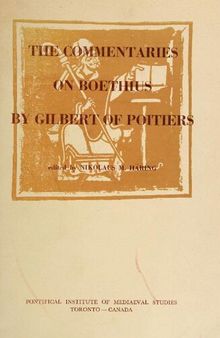دانلود کتاب The Commentaries on Boethius
by Gilbert de la Porre, Bp., d. 1154 & Häring, Nikolaus M.|
|
عنوان فارسی: تفسیرهای بوئتیوس |
 دانلود کتاب
دانلود کتاب
 جزییات کتاب
جزییات کتاب
Gilbert’s beliefs about the Trinity are recorded in his commentaries on the *Opuscula Sacra* of Boethius: the *De Trintate* , Books I and II; the *De Bonorum Ebdomade* ; and the *Contra Euticen et Nestorium*. The editions are based on thirty-nine manuscripts.
As well as critical editions of the texts, Häring has included the original Boethian texts that Gilbert used, an introduction covering Gilbert’s life, a discussion of the manuscripts and of the text that Gilbert used, a bibliography and several appendices.
* * *
cited in the excellent history-of-logic article "[L’héritage négligé des scolastiques: pensée et désignation avant l’essor de la logique post-aristotélicienne](https://isidore.co/misc/Res%20pro%20Deo/Lay%20Philosophers/L%e2%80%99h%c3%a9ritage%20n%c3%a9glig%c3%a9%20des%20scolastiques_pens%c3%a9e%20et%20d%c3%a9signation%20avant%20l%e2%80%99essor%20de%20la%20logique%20post-aristot%c3%a9licienne%20\(SR\).epub)"
I'd heard of Gilbert Poitiers before (§ "De intensione et remissione formarum" of Duhem's [*Études sur Léonard de Vinci* (vol. 3)](https://isidore.co/calibre/#panel=book_details&book_id=4251) mentions Poitiers's *Book of the Six Principles* ), but not his logical work. His ternary " *res et intellectus et sermo* " quote (a foreshadowing of [Peirce's Firstness/Secondness/Thirdness](https://isidore.co/calibre#panel=book_details&book_id=3956)!):
> Tria quippe sunt: res et intellectus et sermo. Res intellectu concipitur, sermone significatur. Sed neque semonis nota, quicquid res est, potest ostendere neque intelligentie actus in omnia, quecumque sunt eiusdem rei, offendere ideoque nec omnia conceptus tenere.
> — *Expositio Boecium librum primum De Trinitate* I, 3 (p. 67, **PDF p. 89** )
Good interpretive translation, from "[L’héritage négligé des scolastiques](https://isidore.co/misc/Res%20pro%20Deo/Lay%20Philosophers/L%e2%80%99h%c3%a9ritage%20n%c3%a9glig%c3%a9%20des%20scolastiques_pens%c3%a9e%20et%20d%c3%a9signation%20avant%20l%e2%80%99essor%20de%20la%20logique%20post-aristot%c3%a9licienne%20\(SR\).epub)":
> Il existe trois [domaines] distincts : la réalité factuelle, la compréhension et le discours. La compréhension d’une chose est conçue, tandis que le discours est signifié. Mais le discours est comme un signe [un médium ou intermédiaire] permettant l’actualisation de l’intelligence en [connaissant] toutes choses, indépendamment de la façon dont les choses sont [en elles-mêmes], par lequel elle [l’intelligence] peut détenir le concept propre de toutes choses [qu’elle connaît].






 این کتاب رو مطالعه کردید؟ نظر شما چیست؟
این کتاب رو مطالعه کردید؟ نظر شما چیست؟
